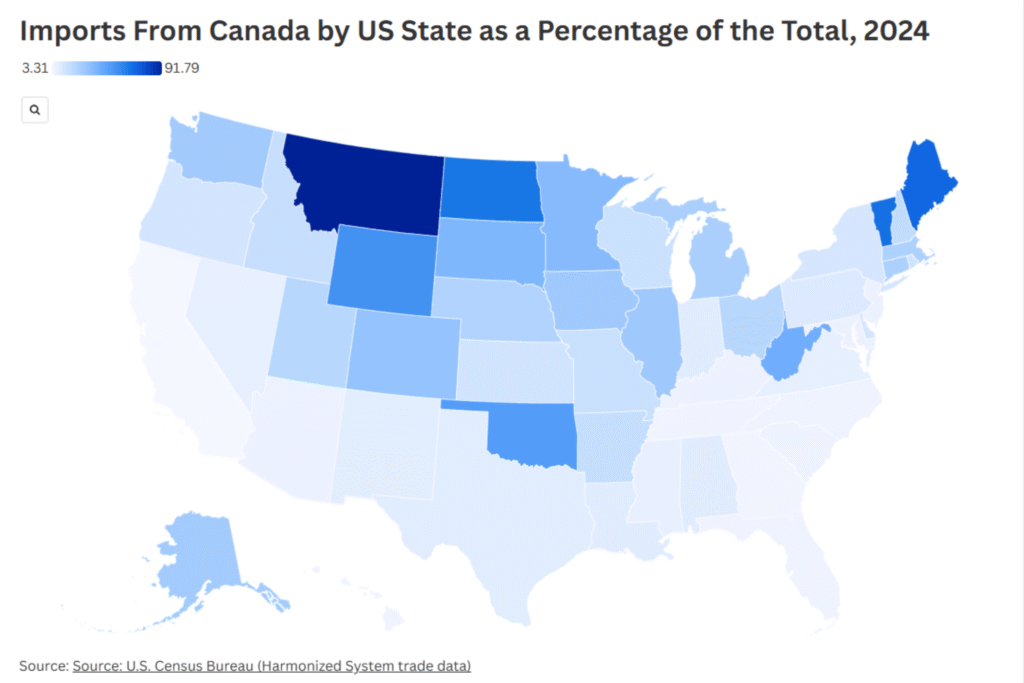U.S. States bordering Canada could feel the greatest impact of President Donald Trump’s 35 percent tariff on Canadian products, which are set to go into effect August 1.
Montana, Maine, Vermont and North Dakota received more than 65 percent of their imports from Canada in 2024, according to Harmonized System trade data from the U.S. Census Bureau.
Why It Matters
The 35 percent tariff is a ten percent hike from the 25 percent rate Trump imposed on America’s trading partner earlier this year, blaming fentanyl coming over the border. It is not yet clear if items under the United States-Mexico-Canada Agreement (USMCA), which are currently exempt, will be included.
The new tariff is separate from the 50 percent steel and aluminum levy and the 25 percent autos tariff duty that Canada is already paying for U.S. imports on those sectors.
Trump announced the new tariff in a letter to Canadian Prime Minister Mark Carney, shared on Truth Social Thursday, in which he accused Canada of having “financially retaliated against the United States.” The president appears to be referencing the 25 percent tariff reciprocal Ottawa imposed on non-USMCA complaint vehicles from the U.S., as well as American steel, apparel food and other items.
Thursday’s letter came after the U.S. and Canada countries agreed to resume trade talks, during a G7 summit, with a deadline to reach a deal by July 21. Those talks appear to have stalled.
What To Know
Montana obtained 91.79 percent of its imports from Canada in 2024, according to the trade data. The Montana Department of Labor & Industry reported that its top three imports from Canada in 2021 were crude oil, platinum waste and scrap, and conifer wood.
Maine got 70.32 percent of its imports from the nation in 2024, Vermont got 66.96 percent and North Dakota got 65.42 percent. In February, Maine Governor Janet Mills said the businesses and individuals in Maine rely on Canada for major energy sources, including heating fuel, gasoline, natural gas and electricity.
“More than 80 percent of Maine’s heating fuel and gasoline is imported from Canada, and 50 percent of our homes rely on oil for home heat. And of course, we don’t have fossil fuel reserves of our own,” Mills said in a press release.
Energy also accounts for about half of Vermont’s imports from Canada, Vermont Public reported.
The Consulate General of Canada in Minneapolis reported that the top imports from Canada to North Dakota in 2024 were crude petroleum, oil seeds and fertilizers.
Wyoming obtained 54.58 percent of its imports from Canada. The remaining 45 states received less than half of their imports from the nation.
While energy appears to be exempt from the new tariff, after Trump imposed a lower ten percent rate earlier this year, the new rates could significantly increase the costs on other goods.
Trump said he would consider an adjustment to the tariff if Canada works with him to “stop the flow of Fentanyl.”
Carney said Canada has made “vital progress to stop the scourge of fentanyl in North America.”
“We are committed to continuing to work with the United States to save lives and protect communities in both our countries,” Carney said.
What People Are Saying
President Donald Trump said in a letter to Mark Carney, shared on Truth Social on Thursday, “As you will recall, the United States imposed tariffs on Canada to deal with our Nation’s Fentanyl crisis, which is caused, in part, by Canada’s failure to stop the drugs from pouring into our Country. Instead of working with the United States, Canada retaliated with its own tariffs.”
Canadian Prime Minister Mark Carney, on X: “Throughout the current trade negotiations with the United States, the Canadian government has steadfastly defended our workers and businesses. We will continue to do so as we work towards the revised deadline of August 1.”
What Happens Next
The 35 percent tariff will be imposed against Canada on August 1. Trump has said that he is prepared to increase the rate again if Canada retaliates with their own levies, or decrease them depending on the country’s relationship with the U.S.
Do you have a story that Newsweek should be covering? Do you have any questions about this story? Contact [email protected].
Read the full article here
